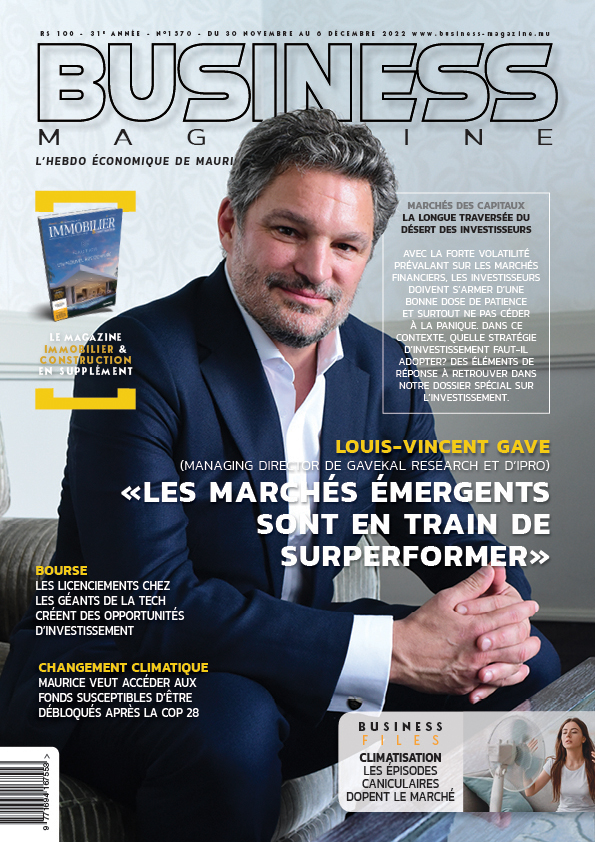Dr Chandan K. Jankee : Marshall Plan for Africa – Opportunities for Mauritius
Share

Under its presidency of G20 Summit, Germany, the leading economy in the European Union (EU), is forging a more concrete link with the African continent by advocating a Marshall Plan. In addition to a brief on the different aspects of this Plan, the objective of this article is to highlight the opportunities for Mauritius with this new Africa Strategy.
Positioning Mauritius as a platform for serving and inves-ting in mainland Africa can pay some dividend but a caveat here is important. Today, the economic landscape in Africa has changed with well perfor-ming economies delivering high growth rates and implementing unprecedented infrastructural and institutional reforms. Mauritius cannot continue to ride on the past economic success d믭 “Economic Miracle”. Mauritius should consolidate its overall framework in terms of economic policies, institutional reforms and capacity building in order to reap the benefits from the Marshall Plan.
The main tenets of the Marshall Plan are given below:
• Africa and the EU need to work on a new partnership agreement for development and peace with mutual benefits. The Marshall Plan is aligning itself with the African Union Agenda 2063 based on political, social, economic, environmental and cultural cooperation with the basic premise to address the challenges facing Africa. With a doubling of population by 2050, policies towards Africa should be geared towards ensuring sustainable development with an emphasis on technology transfer, innovations, access to knowledge with the potential to reverse the trend. A new focus should be based on African ownership and the establishment of joint ventures with Europe rather than Africa being used as a supplier of raw materials to European countries. The dependence on aid must be reduced with emphasis on fair trade and cooperation in various policy areas.
• Priority should be given to training and creation of jobs, taking into account the rapid surge in the youth population. More than 20 million jobs should be created in Africa on an annual basis. This would constitute a major challenge. A closer relationship with Europe is imperative with the setting up of economic structures and relevant training programs. A proper migration policy should be envisaged to facilitate mobility.
• An interesting feature is the pervasive role of the private sector with the design of an attractive package to promote private investment and instill entrepreneurship. Europe would support economic diversification, small and medium enterprises (SMEs), agricultural production and vertical integration. Greater access to single EU market and dismantling of trade barriers should follow.
• The Marshall Plan is also working on a framework which supports the right political environment based on the respect for the rule of law, good governance and sound democratic principles. An inclusive system which is not under the grip of elites should be promoted. Under the Plan, support will be given to all stakeholders promoting good governance, human rights and economic development.
Thus, the Marshall Plan highlights people’s basic needs: food, security, water, energy, infrastructure, digitalization, healthcare and access to education, particularly for women and girls.
The essence of the Marshall Plan is based on three pillars, namely: Economic activity, trade and development; Peace and security; and Democracy and rule of law.
In this new form of cooperation, Germany is encouraging a totally different approach with emphasis on trade rather than the traditional ‘donor and recipient countries’ approach. Emphasis would be laid on countries committed to reforms in all sectors. A single approach would be adopted by all EU member states known as a pan-European effort. Africa would be high on the agenda at the EU Headquarters in Brussels with regular meetings between the EU and Africa. It is to be underscored that a EU-Africa Summit is already in the pipeline. New institutions would be set up to support the implementation of the Marshall Plan.
A new approach is also being adopted in terms of financing so as to reduce reliance on Official Development Assistance (ODA) funds and tap into other sources such as domestic mobilization of revenues and private capital. Higher taxes are possible options and investment guarantees whose objective would be to decrease risks associated with private investment. Currency risks as well as other types of risks should be mitigated with new types of arrangements and international organizations and banks would be called upon to play an even greater role.
The details about the first pillar, namely Economic activity, trade and development, articula-ted in the Marshall Plan are given below:
In the case of Africa, the Plan stipulates the following measures to promote investment and development: “Improve investment climate, develop stable and inclusive financial systems, promote intra-Africa trade, achieve a rapid and successful conclusion of negotiations on a continental free trade area, introduce protective tariffs, expand technical and vocational education…, and ratify World Trade Organization (WTO) trade facilitation agreement.’’ (see Marshall Plan)
In the context of Germany, the following measures are envisaged: “Launch an alliance for jobs and vocational training for Africa’s youth in collaboration with the German private sector ; a package of investment incentives for businesses including double taxation agreements, tax incentives for investment in Africa, advising German businesses in Africa, establishing sustainable supply chains, supporting African financial markets and financial service providers… through acceptance of currency risks or guarantees…, use of ODA to mobilize private capital to boost up employment, develop risk transfer mechanisms… such as credit and loan guarantee schemes …, create new investment products for private investors, form a digitalization centre for African business in collaboration with African partners…” (see Marshall Plan)
Finally, a number of measures are also being worked out at the EU level in order to implement the Marshall Plan. International agreements pertaining to the use of energy, environment protection, quality standards, migration policy, foreign exchange risks, information dissemination, development of infrastructure, use of resources from ODA amongst others, are being prepared.
Similarly, the details are worked out for the different stakeholders in terms of the other two pillars (see Marshall Plan).
Mauritius, which is a high economic performer in Africa, is facing huge challenges to move away from the middle-income trap and graduate to a high-income economy. Moreover, Mauritius has built itself a good reputation at the international level in terms of good governance, ease of doing business with a modern and efficient financial system, respect of democratic principles, an efficient private sector and most importantly, it is viewed as a model for Africa.
Mauritius should take advantage of the new economic environment and play a dual role in the implementation of the Marshall Plan by forging closer diplomatic and business links with Germany and the African continent. In addition to maintaining its strong diplomatic ties with African countries, Mauritius should develop joint ventures with a few targeted countries on the continent as a first step. In this endeavor, the private sector would be required to play an even greater role in the countries identified. Mauritius can benefit from the different incentives available in the Plan to promote investment, education and training. Moreover, given that the objective of the Marshall Plan is to promote African ownership, Mauritius can position itself firmly with EU and German businessmen to invest not only in Mauritius but use our strong institutional setup, infrastructure, and connectivity to channel investment to mainland Africa.
It is imperative for the different stakeholders in Mauritius to develop a new Africa Strategy in line with the Marshall Plan with a view to ensuring that we are included in the process of economic and social development. Economic diplomacy becomes a strategic tool on which the relevant ministry is presently being focused. Hence, Mauritius should reinvent itself in all fields so as to maintain its acquired comparative edge in Africa to be able to reap the benefits from the Marshall Plan.
Source:www.marshallplan-mit-afrika.de




